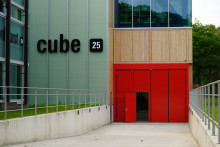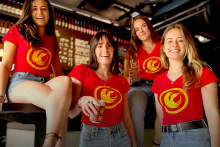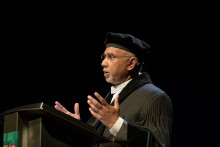IDE student Johan Stekelenburg talks about the Convo on behalf of the winning group. ‘It is a device that a hearing-impaired person can wear with a magnet on his chest. What's special is that the Convo gives feedback to the speaker instead of the hearing impaired,' Stekelenburg says. ‘We focused on one specific person. Our group spent a whole day visiting him, which gave us a complete picture.’
Speech rate
The device provides feedback based on two components: the speaking rate and the volume. ‘We have done extensive research, which showed that you can make a difference to the hearing impaired in these two areas. If a person speaks too fast or too softly, the Convo gives a signal. The Convo is set to the user's preferences.’
‘Psychological effect’
Last Friday, the group heard that they had made the best design out of sixteen groups. The jury included Vera van Lieshout, secretary of study association Daedalus, and UT researchers Edwin Dertien and Wouter Eggink. They recently designed personalised products for people with a disorder in the BNNVARA programme ‘We gaan het maken’. Eggink: 'The solution of the Convo is strong because the communication problem is turned around. The non-disabled person must ensure that the communication is 'in tune' with the wearer of the device. This is not only a practical solution, but also has a very strong psychological effect.’
Stroke
It was not only the project of Stekelenburg and co that won prizes. The group that developed the Wonderglove took the public prize and was runner-up with the jury. Student Berk Yilmaz talks about their design: 'From the beginning, our project revolved around Floris*. He is an elderly man who became paralysed on his left side following a stroke. For this reason, he has little control over the muscles in his hand. What we liked was that he didn't want a machine to do the work for him, but that he wanted to continue doing everything himself.’
*Floris is a fictitious name
winning groups
Group 4 ‘Convo’
- Rozanne van Groos
- Laura Grütters
- Calvin Haring
- Inge Mengerink
- Sofie van Pelt
- Jinte Pomper
- Johan Stekelenburg
Group 9 ‘Wonderglove’
- Jolien Crum
- David van Dijk
- Femke Dijksterhuis
- Nils Nietsch
- Giacomo Serra
- Nic Ward
- Berk Yilmaz]
The group came up with the 'Wonderglove'. According to Yilmaz, it is a simple system that retracts the fingers. In the normal position the fingers are pulled inwards. ‘By tightening his muscles, Floris can move a finger with the glove. His finger then pulls backwards, because there is constant resistance on the fingers. Floris received four prototypes and it works better than he expected. Before, he did not dare put a glass of water on the table with his left hand. He would first pass the glass to his right hand and then put it on the table. Now he can do it in one go.’
Appreciation
Yilmaz and his group are happy with the public award, but the fact that Floris is happy with the glove gives them more satisfaction. ‘We said that from the beginning: we are doing it for him. He calls us his fan club. We are going to keep an eye on him in the near future, to see how he likes the glove.'
Stekelenburg uses similar words to Yilmaz for the win. 'It was not primarily our intention to win. We mainly wanted to tackle the problem for the hearing impaired, but the fact that the experts in the jury are so positive about the Convo gives us a good feeling.’






